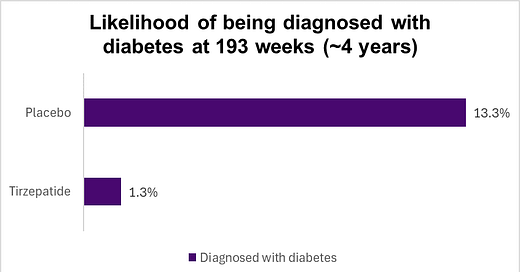Summary: The GLP-1 tirzepatide associated with a 93% decrease in onset of diabetes over a 4-year study period in those with “prediabetes.”
Source: Jastrobuff, et al New Engl J Med November 13, 2024.
There was more good news about tirzepatide (Mounjaro, Zepbound) presented at the American Heart Association and published in the New England Journal last week. Those randomized in a well-designed multiyear trial to tirzepatide, either 5 mg, 10 mg, or 15 mg per week, were 93% less likely to be diagnosed with diabetes over this study period.
The trial was funded by Eli Lilly, the manufacturer, and this report focuses on outcomes of those in this study with prediabetes. Study participants had not been diagnosed with type 2 diabetes but had either high blood sugar or hemoglobin A1C before the trial started. Average age of participants was 48, and most were women (64%) and white (73%). Only one of 253 participants on the highest dose of tirzepatide was diagnosed with type 2 diabetes (0.4%).
Implications for employers:
This is further evidence of the impressive clinical benefit of GLP-1 medications, which decrease both weight and inflammation.
It appears that the most potent GLP-1 medications (semaglutide and tirzepatide) have the largest effect in preventing diabetes or other complications of diabetes.
This suggests that coverage of GLP-1 drugs is likely to lead to some cost savings from preventing diabetes and other complications of obesity. However, many of these savings will occur years after the drugs are started, and the high cost of these medications still means that these drugs will not lower total medical expenses.



